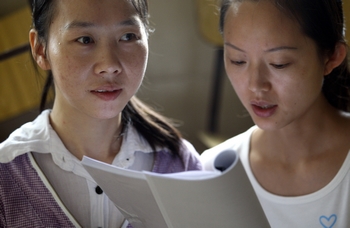Life and Leisure
New view on life
By Zhang Zixuan (China Daily)
Updated: 2010-08-17 13:40
 |
Large Medium Small |

Cui Zhenyun (second from right), one of four professional actors, rehearses a play with four visually impaired performers from Xinmu Theater Workshop. Photos by Zhang Wei / China Daily |
The play, Princess Maleine, explores love and revenge with metaphors of lightness and darkness, which has a particular resonance for visually impaired performers of the Xinmu Theater Workshop, Zhang Zixuan reports
In an old, empty classroom, a young woman leans in a young man's arms, whispering in his ear, tenderness and love shining in her eyes. It's hard to believe she is virtually blind.
Wang Juan, 27, lost most of her eyesight in a car accident in 2003. She and eight other visually impaired performers are rehearsing Princess Maleine by Belgian playwright, Nobel Literature Laureate Maurice Maeterlinck (1862-1949), which will debut in mid-September at Beijing's Fengshang Theater.
"Cultural activities bring dignity vital for visually impaired people to be continuously involved in social life," says Zheng Xiaojie, head of Beijing Hongdandan Education & Culture Exchange Center, who initiated the Xinmu Theater Workshop.
Xinmu is the first non-governmental theater troupe in China composed of mainly visually impaired people. In May 2008, the workshop successfully staged The Blind, also by Maeterlinck, to gather funds for victims of the Wenchuan earthquake.
All nine visually impaired performers for Princess Maleine were recruited through public audition this March. For five months, the company has been rehearsing in the workshop's quadrangle courtyard, which consists of the central rehearsal room, a meeting room and a designer's studio. At the center of the courtyard is a huge white board with details of the cast.
The rent for the rehearsal room alone is 600 yuan ($89) per day, says Zeng Xin, Hongdandan's finance manager. "That's tough for a non-profit organization, but it's worth it."

A professional actress helps Wang Juan (left) recite the script. |
The workshop couldn't survive without the dedication of everyone involved, Zeng says, adding that Wang Juan, for example, came from Shenzhen for the audition and rehearsal at her own expense.
Backed by her parents, Wang shuttled between Shenzhen and Beijing for the auditions and won the leading role.
"The play means a lot to me; it's changed my view of life," says Wang, who plays the Princess.
Wang said she had been depressed after the accident, until the audition.
"Everyone was chosen for a reason; I don't take them less seriously because they're vision impaired and amateur," says French director Jean-Christophe Blondel, who spent eight days considering more than 50 candidates.
Having explored various art forms for some 13 years, Blondel chanced upon Hongdandan in last year's French/Chinese Cultural Festival. When Hongdandan invited him to help the amateur theater workshop, he accepted immediately.
Blondel chose Maeterlinck's Princess Maleine, as most Chinese know little about the Belgian playwright.
"The play explores love and revenge with metaphors such as lightness and darkness, which can connect with the visually impaired performers, so they are more likely to touch the heart of the play," Blondel says.
He finds that the performers steer clear of obstacles by identifying the slight changes in sound waves and airflow, which other people never notice.
"Their impairment provides a unique relationship between their bodies and the environment, which brings something new that couldn't be found among professional performers," Blomdel says.
Dong Lina, 26, who was born blind, takes turns playing the role of Princess Maleine with Wang Juan. Her broadcast-trained voice adds poetic color to the role's temperament.
Despite having mastered all her lines, she is still not satisfied with her body language. "The director usually holds my arms to guide my movement, but I think it's still rigid."
Cui Zhenyun, one of four non-visually impaired professional actors in the 13-performer play, thinks Dong and her amateur colleagues are doing a great job.
"Their enthusiasm toward life and the play astonished me," Cui says.
The 23-year-old actor declined a role in a movie to perform a supporting role in the play. His performance finally won him the leading role of Prince Hjalmar.
At first, Cui had concerns. "Can they make it? What if they fall on stage?"
However, once the rehearsals started, Cui was had no such qualms.
One scene shows Prince Hjalmar secretly meeting Princess Maleine at night. Cui was asked to cover his eyes with a piece of cloth to understand the darkness. Several times he and the actress had to fumble for each other.
At a corner of the rehearsal room stands a young man dressed in bright pink, practicing a short tongue twister.
Yang Kang, 24, lost his eyesight due to a rare retina cancer at 11. Besides playing several minor roles, the part-time bar pianist is in charge of the piano accompaniment.
"The melody is jumpy. I count on my experience instead of fingers," says Yang, who started learning piano after becoming blind.
Yang feels happy that visually impaired people now have a wider range of career choices, but he also says that it will take time before society fully recognizes the capabilities of the disabled.
"Our play proves that what others can do, we can do too," Yang says with pride.
Aside from the devoted performers and a professional production team, the contribution from volunteers has also helped make the play a reality, Zeng says.
Yao Zeyu, 18, volunteered to translate for Blondel before she continues her studies at Cornell University. At the rehearsal room, Yao gives tips to Dong and other performers on lines, movements and standing positions.
"These visually impaired performers have a lot of stuff to memorize, which requires us volunteers to be intimately familiar with the script," Yao says.
Her studies in America means it will be impossible for her to see the play's debut in September, but she doesn't mind.
"I've witnessed and been part of the miracle, there's no regret."